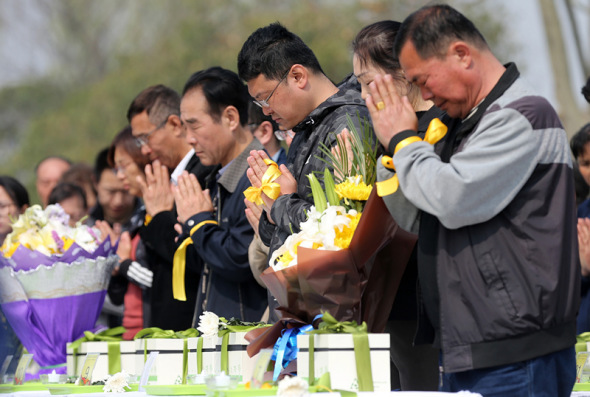
People pray in the cemetery before burying ashes under saplings on Saturday. (Photo: China Daily /Wang Zhuangfei)
Environmental benefits
However, green funerals are still in their infancy in China because most people still prefer traditional burials in cemeteries.
Data supplied by the Beijing Civil Affairs Bureau show that just 3 percent of people in the capital choose sea burials, while Yang Hu, the funeral director from Zhengzhou, said only a few people per 1,000 in the city opt for tree burials.
Zhu, 81, a retired senior engineer at the railway bureau of Zhengzhou who preferred not to give his full name, took his son's ashes to the tree burial on Saturday. Zhu's son died in 1996 at age 33, and after keeping the ashes at home for more than two decades, he and his two remaining sons decided to return them to nature.
When discussing his own funeral, Zhu said the environmental benefits of green funerals mean he supports the practice, but he will still buy a conventional plot in a graveyard.
"My parents were buried on Mangshan Mountain, south of the Yellow River. I want to be with them after death. My pension means I can afford a tomb, and I will arrange my funeral in advance," he said.
Ingrained attitudes
In rural areas, it is difficult to change ingrained attitudes toward farmland as a burial site, because tradition says the body should be fully respected and only by being buried can the dead rest in peace.
The task facing promoters of green funerals was underlined by a video of an extreme burial that went viral online in 2016. In the clip, 64 men in traditional yellow clothing are seen singing and parading through the streets in Zhangjiakou, Hebei province, and carrying a highly decorated coffin.
Commenting on the video, a local civil affairs official told Legal Daily that Zhangjiakou has many mountainous areas.
That means the land is unsuitable for cultivation but easily accommodates burials, so the popularity of interment hampers the promotion of green funerals.
"The villagers find it difficult to accept cremation, let alone green funerals which require the scattering of ashes," he said.
Sun, the professor in Beijing, said it will take a long time to change age-old customs.
"The move from traditional tombs to burying ashes under a tree or at sea, which means not keeping the ashes, will be a gradual process that could take generations. In my opinion, keeping ashes in the walls of funeral homes would be an important transition method."
Li Hongbing, deputy chief of the Beijing Bureau of Civil Affairs, said the city government will adopt a gradual approach and will not enforce green burials.
"What we can do is to encourage and persuade. We must ensure that people make their own choices. It is a matter of custom and tradition, after all," he said.


















































